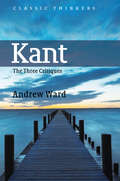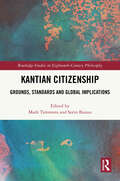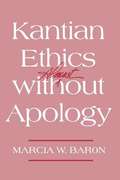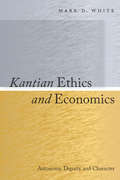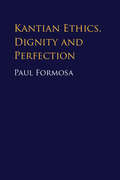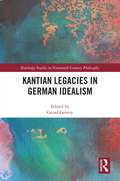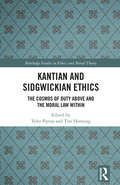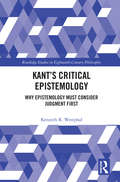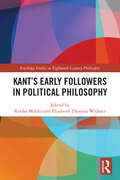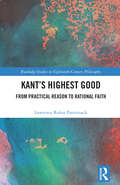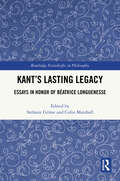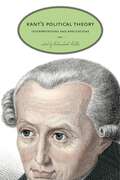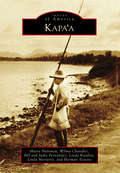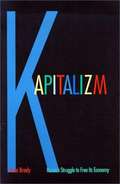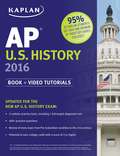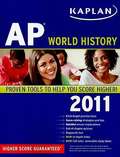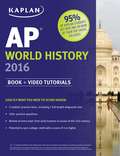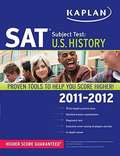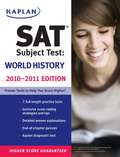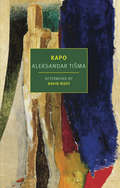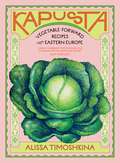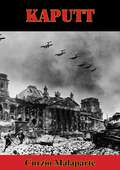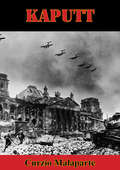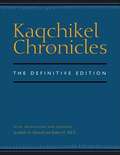- Table View
- List View
Kant: The Three Critiques (Classic Thinkers)
by Andrew WardImmanuel Kants three critiques the Critique of Pure Reason, the Critique of Practical Reason and the Critique of Judgment are among the pinnacles of Western Philosophy. This accessible study grounds Kants philosophical position in the context of his intellectual influences, most notably against the background of the scepticism and empiricism of David Hume. It is an ideal critical introduction to Kants views in the key areas of knowledge and metaphysics; morality and freedom; and beauty and design. By examining the Kantian system in the light of contemporary arguments, Ward brings the structure and force of Kants Copernican Revolution in Philosophy into sharp focus. Kant is often misrepresented as a somewhat dry thinker, yet the clarity of Wards exposition of his main themes, science, morality and aesthetics, through the three critiques brings his writings and theories to life. Lucidly and persuasively written, this book will be a valuable resource for students and scholars seeking to understand Kants immense influence.
Kantian Citizenship: Grounds, Standards and Global Implications (Routledge Studies in Eighteenth-Century Philosophy)
by Mark Timmons Sorin BaiasuThis book is a collection of 12 new essays on the topic of Kant’s account of citizenship, the first book-length text on this topic. It features an international cast of leading scholars who specialize in Kant’s ethics, philosophy of religion and political philosophy. The contributors connect Kant’s philosophy with contemporary issues concerning citizenship, including the moral grounds of citizenship rights, the relation between citizenship, human rights and dignity, civic virtues, citizenship in the ethical commonwealth, in particular the moral function of religious rituals, the link between ethical duties and faith, and the relation between religious freedom and political power, democratic participation, the legitimacy of international courts, just war theory, cosmopolitanism and the contemporary relevance of a Kantian account of citizenship.The topic is of interest given some of the currently urgent citizenship-related challenges that we are facing today. Kant’s account of justice stipulates that, in a fair and peaceful world, the legal framework that establishes rights and obligations should be effective at national, international and cosmopolitan levels. Kant’s legal and political philosophy also features the unique combination of a realistic appraisal of the human condition and powerful normative recommendations concerning action and principles of ethics and law. Together with Kant’s emphasis on the requirement of consistency, the approaches discussed in the volume are better able to orient thinking and guide action for currently urgent ethical, legal, political and social problems.Kantian Citizenship will appeal to scholars and graduate students working on Kant’s legal and political philosophy, as well as scholars from other fields who are interested in legal philosophy and the politics of citizenship.
Kantian Ethics Almost Without Apology
by Marcia W. BaronA defence of Kant's deontological conception of ethics. The author offers reflections on two supposed problems with Kant's ethics: that it leaves no room for supererogatory actions and that it overemphasizes the value of acting from duty.
Kantian Ethics and Economics
by Mark D. WhiteThis book introduces the moral philosophy of Immanuel Kant-in particular, the concepts of autonomy, dignity, and character-to economic theory, explaining the importance of integrating these two streams of intellectual thought. Mainstream economics is rooted in classical utilitarianism, recommending that decision makers choose the options that are expected to generate the largest net benefits. For individuals, the standard economic model fails to incorporate the role of principles in decision-making, and also denies the possibility of true choice, which can be independent of preferences and principles altogether. For policymakers, standard decision-making frameworks recommend tradeoffs that are beneficial in terms of material goods or wealth, but may be morally questionable from a more person-centered perspective. Integrating Kantian ethics affects economics in three important ways. This integration allows for a more complete understanding of human choice, incorporating not just preferences and constraints, but also principles and strength of will or character. It demonstrates the broader impact of welfare economics, which generates policies that affect not only persons' well-being, but also their dignity and autonomy. Finally, it reconciles the traditional, individualist stance in economic models of choice with the social responsibility emphasized by many systems of philosophical ethics and heterodox schools of economics.
Kantian Ethics, Dignity and Perfection
by Paul FormosaIn this volume Paul Formosa sets out a novel approach to Kantian ethics as an ethics of dignity by focusing on the Formula of Humanity as a normative principle distinct from the Formula of Universal Law. By situating the Kantian conception of dignity within the wider literature on dignity, he develops an important distinction between status dignity, which all rational agents have, and achievement dignity, which all rational agents should aspire to. He then explores constructivist and realist views on the foundation of the dignity of rational agents, before developing a compelling account of who does and does not have status dignity and of what kind of achievement dignity or virtue we, as vulnerable rational agents, can and should strive for. His study will be highly valuable for those interested in Kant's ethical, moral and political philosophies.
Kantian Legacies in German Idealism (Routledge Studies in Nineteenth-Century Philosophy)
by Gerad GentryScholarship on Immanuel Kant and the German Idealists often attends to the points of divergence. While differences are vital, this volume does the opposite, offering a close inspection of some of the key Kantian concepts that are embraced and retained by the Idealists. It does this by bringing together an original set of critical reflections on the role that the German Idealists ascribe to fundamental Kantian ideas and insights within their own systems. A central motivation for this volume is to resist reductive accounts of the complex relationship between German Idealism and Kant’s Idealism through a study of the inheritance of Kant’s legacy in German Idealism. As such, this volume contributes to new interpretations and rethinking of traditional accounts in light of these reflections on some of the significant components of German Idealism that can defensibly be called Kantian. The contributors to this volume are Dina Emundts, Eckart Förster, Gerad Gentry, Johannes Haag, Dean Moyar, Lydia Moland, Dalia Nassar, Karin Nisenbaum, Anne Pollok, and Nicholas Stang.
Kantian and Sidgwickian Ethics: The Cosmos of Duty Above and the Moral Law Within (Routledge Studies in Ethics and Moral Theory)
by Tim Henning Tyler PaytasImmanuel Kant and Henry Sidgwick are towering figures in the history of moral philosophy. Kant’s views on ethics continue to be discussed and studied in detail not only in philosophy, but also theology, political science, and legal theory. Meanwhile, Sidgwick is emerging as the philosopher within the utilitarian tradition who merits the same meticulous treatment that Kant receives. As champions of deontology and consequentialism respectively, Kant and Sidgwick disagree on many important issues. However, close examination reveals a surprising amount of consensus on various topics including moral psychology, moral epistemology, and moral theology. This book presents points of agreement and disagreement in the writings of these two giants of philosophical ethics. The chapters will stimulate discussions among moral theorists and historians of philosophy by applying cutting-edge scholarship on each philosopher to shed light on some of the more perplexing arguments and views of the other, and by uncovering and examining points of agreement between Sidgwick and Kant as possible grounds for greater convergence in contemporary moral philosophy. This is the first full-length volume to investigate Sidgwick and Kant side by side. It will be of major interest to researchers and advanced students working in moral philosophy and its history.
Kant’s Critical Epistemology: Why Epistemology Must Consider Judgment First (Routledge Studies in Eighteenth-Century Philosophy)
by Kenneth R. WestphalThis book assesses and defends Kant’s Critical epistemology, and the rich yet neglected resources it provides for understanding and resolving fundamental issues regarding human experience, perceptual judgment, empirical knowledge and cognitive sciences.Kenneth Westphal first examines Kant’s methods and strategies for examining human sensory-perceptual experience, and then examines Kant’s central, proper, and subtle attention to judgment, and so to the humanly possible valid use of concepts and principles to judge particulars we confront. This provides a comprehensive account of Kant’s anti-Cartesianism, the integrity of his three principles of causal judgment, and Kant’s account of disciminatory perceptual-motor behaviour, including both sensory reafference and perceptual affordances. Westphal then defends the significance of Kant’s subtle and illuminating account of causal judgment for three main philosophical domains: history and philosophy of science, theory of action and human freedom, and philosophy of mind.Kant’s Critical Epistemology will appeal to researchers and advanced students interested in Kant and the relations of his thought to contemporary philosophical debates and to the sciences of the mind.
Kant’s Early Followers in Political Philosophy (Routledge Studies in Eighteenth-Century Philosophy)
by Reidar Maliks Theresia Widmer, ElisabethImmanuel Kant influenced a large and productive group of political philosophers in the 1790s. This volume argues that they brought out more fully the egalitarian principles of Kantian republicanism.“The Kantian school” featured young philosophers including Saul Ascher, Johann Adam Bergk, Johann Benjamin Erhard, Johann Ludwig Ewald, the early Johann Gottlieb Fichte, Friedrich Schlegel, and Johann Heinrich Tieftrunk. The chapters in this volume analyze their work in relation to Kant and their wider philosophical and political context. They advance three main theses. First, the Kantians defended popular sovereignty and several of them supported the extension of the right to vote to workers and women. Second, several of them developed a political perfectionism, the view that equal political rights are justified for their effects on cultivating moral character. Third, they developed sophisticated theories of state legitimacy and collective action, defending a people’s right to change their constitution, either through reform or through revolution.Kant’s Early Followers in Political Philosophy offers a systematic view into a neglected group of thinkers at a foundational moment for modern political thought. It will be of interest to scholars and graduate students working on Kant, eighteenth- century philosophy, political philosophy, and the history of early modern German political thought.
Kant’s Highest Good: From Practical Reason to Rational Faith (Routledge Studies in Eighteenth-Century Philosophy)
by Lawrence Robin PasternackKant’s doctrine of the Highest Good is among the most perplexing and controversial aspects of his practical philosophy. There is widespread disagreement about exactly what the Highest Good is, how Kant argues for it, and what function it is supposed to fulfill. The Highest Good is also situated at the nexus of some of the most acrimonious disputes within Kant scholarship.This book is the first comprehensive, English-language interpretation of the Highest Good’s internal structure, its development, and its place within Kant’s broader philosophical system. Pasternack offers sustained engagement with the contemporary secondary literature on these issues, and discusses key texts of the German Enlightenment which helped to shape Kant’s conception of the Highest Good. He argues that prevailing interpretations rely upon a faulty understanding of the Highest Good, one which has its roots in a number of early interpretive missteps. Pasternack proceeds to discuss how the Highest Good relates to other elements of Kant’s philosophical system, including the conflicting interpretations of his moral psychology, the epistemic strictures of Transcendental Idealism, and how to reconcile his positive philosophy of religion with these strictures.
Kant’s Lasting Legacy: Essays in Honor of Béatrice Longuenesse (Routledge Festschrifts in Philosophy)
by Colin Marshall Stefanie GrüneBéatrice Longuenesse is one of the most important scholars of German philosophy in the past 50 years. This volume features original essays written by Longuenesse’s long-time interlocutors and former students that reflect on the breadth and influence of her work.In Longuenesse’s earlier work, she shed light on the importance of subtle features of Kant’s and Hegel’s philosophical systems. Her more recent work has built on doctrines concerning the self and self-consciousness from Kant and other philosophers, demonstrating the continued relevance of history of philosophy to contemporary philosophy. The chapters are divided into two thematic sections that (1) read Kant and Hegel and (2) reflect on the state of Kantianism today. The volume concludes with an autobiographical essay written by Longuenesse that reflects on her philosophical journey. Many of the essays engage directly with Longuenesse’s work, while others are written on closely related themes in a similar spirit. Altogether, the chapters express the ongoing importance of Longuenesse’s accomplishments and the vibrant state of the field.Kant’s Lasting Legacy will appeal to scholars and advanced students interested in Kant, the history of German philosophy, and philosophy of mind.
Kant’s Political Theory: Interpretations and Applications
by Elisabeth EllisPast interpreters of Kant’s thought seldom viewed his writings on politics as having much importance, especially in comparison with his writings on ethics, which (along with his major works, such as the Critique of Pure Reason) received the lion’s share of attention. But in recent years a new generation of scholars has revived interest in what Kant had to say about politics. From a position of engagement with today’s most pressing questions, this volume of essays offers a comprehensive introduction to Kant’s often misunderstood political thought. Covering the full range of sources of Kant’s political theory—including not only the Doctrine of Right, the Critiques, and the political essays but also Kant’s lectures and minor writings—the volume’s distinguished contributors demonstrate that Kant’s philosophy offers compelling positions that continue to inspire the best thinking on politics today.Aside from the editor, the contributors are Michaele Ferguson, Louis-Philippe Hodgson, Ian Hunter, John Christian Laursen, Mika LaVaque-Manty, Onora O’Neill, Thomas W. Pogge, Arthur Ripstein, and Robert S. Taylor.
Kant’s Political Theory: Interpretations and Applications
by Elisabeth EllisPast interpreters of Kant’s thought seldom viewed his writings on politics as having much importance, especially in comparison with his writings on ethics, which (along with his major works, such as the Critique of Pure Reason) received the lion’s share of attention. But in recent years a new generation of scholars has revived interest in what Kant had to say about politics. From a position of engagement with today’s most pressing questions, this volume of essays offers a comprehensive introduction to Kant’s often misunderstood political thought. Covering the full range of sources of Kant’s political theory—including not only the Doctrine of Right, the Critiques, and the political essays but also Kant’s lectures and minor writings—the volume’s distinguished contributors demonstrate that Kant’s philosophy offers compelling positions that continue to inspire the best thinking on politics today.Aside from the editor, the contributors are Michaele Ferguson, Louis-Philippe Hodgson, Ian Hunter, John Christian Laursen, Mika LaVaque-Manty, Onora O’Neill, Thomas W. Pogge, Arthur Ripstein, and Robert S. Taylor.
Kapa'a
by Bill Fernandez Wilma Chandler Linda Kaialoa Judie Fernandez Marta HulsmanKapa'a, like most rural towns on Kaua'i and many in Hawai'i, got its start in the 19th century as a sugar town. But, within five years, Kapa'a's sugar mill was gone; the little village almost disappeared. By the early 20th century, Kapa'a was once again a thriving community. Self-reliant merchants and shopkeepers, first mostly Chinese and then Japanese, competed with the neighboring plantation store. Homesteaders populated the hills behind Kapa'a, and two pineapple canneries offered employment. Several movie theaters provided alternatives to the bars and taxi-dance halls. By the 1970s, pineapple, too, was gone, and Kapa'a faced new challenges. Today, new entrepreneurs working alongside the old provide entertainment for a new clientele of pleasure-seekers, tourists.
Kapitalizm: Russia's Struggle to Free Its Economy
by Rose BradyRose Brady, former Moscow bureau chief for Business Week magazine, here provides a compelling firsthand account of Russia's transition from a socialist state to a market economy. Taking us into the factories, stores, banks, markets, homes, schools, and corridors of power in Russia, she explains how the country's own brand of capitalism has evolved.
Kaplan AP U.S. History 2016
by Krista DornbushThe Advanced Placement test preparation guide that delivers 75 years of proven Kaplan experience and features exclusive strategies, practice, and review to help students ace the AP U.S. History exam! Students spend the school year preparing for the AP U.S. History test. Now it's time to reap the rewards: money-saving college credit, advanced placement, or an admissions edge. However, achieving a top score on the AP U.S. History exam requires more than knowing the material--students need to get comfortable with the test format itself, prepare for pitfalls, and arm themselves with foolproof strategies. That's where the Kaplan plan has the clear advantage. Kaplan's AP U.S. History 2016 contains many essential and unique features to help improve test scores, including: * Four full-length practice tests and a diagnostic test to target areas for score improvement * Detailed answer explanations * Expert video tutorials * A study sheet packed with key dates, terms, and facts * Tips and strategies for scoring higher from expert AP U.S. History teachers and students who got a perfect 5 on the exam * Targeted review of the most up-to-date content, including any information about test changes and key information that is specific to the AP U.S. History exam * A comprehensive index and glossary of key terms and concepts Kaplan's AP U.S. History 2016 authors Krista Dornbush, Steve Mercado, and Diane Vecchio have a combined total of over 40 years of experience teaching U.S. history as well as world and European history. Their expertise has helped make this and other books the best that Kaplan has to offer in AP test prep. Kaplan's AP U.S. History 2016 provides students with everything they need to improve their scores--guaranteed. Kaplan's Higher Score guarantee provides security that no other test preparation guide on the market can match. Kaplan has helped more than three million students to prepare for standardized tests. We invest more than $4.5 million annually in research and support for our products. We know that our test-taking techniques and strategies work and our materials are completely up-to-date. Kaplan's AP U.S. History 2016 is the must-have preparation tool for every student looking to do better on the AP U.S. History test!
Kaplan AP World History 2011
by Patrick Whelan Jennifer LadenYou've spent the year gaining advanced knowledge. Now it's time to reap the rewards: money-saving college credit or advanced placement, and an admissions edge. Yet a top score on the AP exam requires more than knowing the material. Even if your instructor was great and you worked hard in class, you need to get comfortable with the test format itself, preparing for pitfalls and arming yourself with foolproof strategies. That's where the Kaplan plan offers the clear advantage. With more than 70 years of proven test-prep experience, Kaplan has developed unique study guides that provide cutting-edge review while honing your test-taking skills. Kaplan's AP exam preparation guides include everything you need to know to score higher on the test-guaranteed. Let your score soar with these Kaplan features: * Tips from students who earned a perfect 5 on the AP Macroeconomics/Microeconomics exam * Strategies from AP Macroeconomics/Microeconomics teachers * A new group study guide, helping all group members make the most of their study sessions * Breakthrough advice for parents-on everything from using the book as a coaching aid to preparing for exam day * 2 full-length practice tests (essential for learning how to beat the clock) * An intensive diagnostic test so that you can use your time efficiently, targeting weak areas and feeling confident in your strengths * Detailed explanations to the answers, showing you how to think like the authors of the test * Glossary of key terms and concepts * Sample document-based and free-response questions * Proven skill-building techniques that are guaranteed to raise your score * A user-friendly design for navigating the book in a flash Preparation makes the difference, but quality preparation delivers results that can transform your life. Packed with exclusive tips you can only get from Kaplan, this is the ultimate guide for conquering jittery nerves and boosting brain power. Unlock your potential with Kaplan AP Macroeconomics/Microeconomics 2010: the unrivaled, one-stop resource.
Kaplan AP World History 2016
by Patrick WhelanThe Advanced Placement test preparation guide that delivers 70 years of proven Kaplan experience and features exclusive strategies, practice, and review to help students ace the AP World History exam! Students spend the school year preparing for the AP World History test. Now it's time to reap the rewards: money-saving college credit, advanced placement, or an admissions edge. However, achieving a top score on the AP World History exam requires more than knowing the material--students need to get comfortable with the test format itself, prepare for pitfalls, and arm themselves with foolproof strategies. That's where the Kaplan plan has the clear advantage. Kaplan's AP World History 2016 contains many essential and unique features to help improve test scores, including: * Four full-length practice tests and a diagnostic test to target areas for score improvement * Detailed answer explanations * Expert video tutorials * Tips and strategies for scoring higher from expert AP World History teachers and students who got a perfect 5 on the exam * Targeted review of the most up-to-date content, including any information about test changes and key information that is specific to the AP World History exam Kaplan's AP World History 2016 authors Patrick Whelan and Jennifer Laden have a combined total of nearly 40 years of experience teaching world and global history. Their expertise has helped make this and other books the best that Kaplan has to offer in AP test prep. Kaplan's AP World History 2016 provides students with everything they need to improve their scores--guaranteed. Kaplan's Higher Score guarantee provides security that no other test preparation guide on the market can match. Kaplan has helped more than three million students to prepare for standardized tests. We invest more than $4.5 million annually in research and support for our products. We know that our test-taking techniques and strategies work and our materials are completely up-to-date. Kaplan's AP World History 2016 is the must-have preparation tool for every student looking to do better on the AP World History test!
Kaplan SAT Subject Test: U.S. History 2011-2012
by Mark Willner Joann Peters Eugene V. Resnick Jeff SchneiderThis book is designed to help high school students understand their SAT U.S. history test.
Kaplan SAT Subject Test: World History 2010-2011
by Peggy J. MartinKaplan SAT Subject Tests offer the most up-to-date and complete coverage of both content review and strategy needed to achieve a high score on these challenging exams, which can be used for college credit at many schools. Each book contains a Kaplan diagnostic test, full-length practice tests, chapter quizzes, score-raising tips, and detailed answer explanations. Also included is a special section with details and advice on the new SAT score-reporting changes. Kaplan's Higher Score Guarantee gives students a significant edge during these competitive times. With focused content review, proven strategies for scoring higher, and comprehensive test practice, Kaplan SAT Subject Tests get students ready for test day. Kaplan SAT Subject Test: Physicsincludes: 3 full-length Physics practice tests A full-length diagnostic test Focused chapter summaries, highlights, and quizzes Detailed answer explanations Proven score-raising strategies
Kapo
by Aleksander TismaA devastating novel about the attrocities of WWII, and the unspeakable things people did to survive, by one of Yugoslavia's great literary voices.Lamian is a survivor, but a survivor of a very special kind. He was a Kapo, a prisoner who served as a camp guard in order to save himself. But has Lamian saved himself?The war over, he resumes life in the Bosnian town of Banja Luka, works in a land-surveying office, rents a room, eats as many hot potatoes as he likes, not even bothering to salt them—the quantity is what matters. If only he could stop looking over his shoulder and flinching on the street in the fear that some stranger will step forward, smack his face, and say in a loud voice, &“Here&’s one!&”If only he could stop worrying about Helena Lifka, who turned out to be a Yugoslav, and Jewish too; one of the women he made come naked into the toolshed where he hid the gold, and sit on his lap in exchange for bread and butter and a little warm milk. She could turn up any day, an old woman now, and point an accusing finger.In this masterful novel, Aleksandar Tišma shows step by step how fear can turn an ordinary human being into a monster.
Kapusta: Vegetable-Forward Recipes from Eastern Europe
by Alissa Timoshkina"Come for the food and stay for the stories – every curious cook will take a leaf out of this book." – Yotam Ottolenghi "A rare cookbook that engages our thinking and delights our senses." – Olia Hercules "This book is just as warm and inviting and shines a fresh light on the world of Eastern European food." – Zuza ZakA culinary journey across Eastern Europe, Kapusta celebrates the humble vegetables that have shaped some of the most vibrant culinary traditions in the world. Focusing on five key vegetables to the region – cabbage, beetroot, potato, carrot and mushrooms – it honours a philosophy of cooking that has affordability, seasonality, sustainability and, above all, great flavour at its heart. With chapters on dumplings and pickles and ferments as well, you’ll find a diversity of dishes which exemplify the Eastern European culinary DNA. Recipes are accompanied by beautiful photography and include a range of both meat-based and vegetarian dishes such as A Cabbage Strudel, both Vegan and Beef Borsch, Potato Babka, Pierogi, a Tzimmes Carrot Cake, Bulgarian Mushroom and Walnut Pâté, and a range of sauerkrauts. Kapusta bursts with original recipes and shines a spotlight on the whole kaleidoscope of little-known culinary cultures and history from across the extensive region.
Kaputt
by Curzio MalaparteKaputt in its literal meaning is the swan song of a Europe, broken, smashed, finished.Europe was KAPUTT—from the highest military and diplomatic circles living in extravagant splendour, decadence and cruel debauchery, to the dregs of humanity living in filth and rags. A remarkable panorama of the moral and physical decline of European civilisation, KAPUTT is one of the great novels of the century.Curzio Malaparte was born in Prato, Italy, of Austrian, Italian and Russian descent. He served with the French and Italian armies during World War I and gleaned his knowledge of Europe and its leaders from his experience in the Italian diplomatic service and as a correspondent.‘One of the most astonishing documents of our time’—New Yorker‘Incredible and terrifying... an amazing book’—New York Times
Kaputt (New York Review Books. Classics)
by Professor Cesare Foligno Curzio MalaparteKaputt in its literal meaning is the swan song of a Europe, broken, smashed, finished.Europe was KAPUTT--from the highest military and diplomatic circles living in extravagant splendour, decadence and cruel debauchery, to the dregs of humanity living in filth and rags. A remarkable panorama of the moral and physical decline of European civilisation, KAPUTT is one of the great novels of the century.Curzio Malaparte was born in Prato, Italy, of Austrian, Italian and Russian descent. He served with the French and Italian armies during World War I and gleaned his knowledge of Europe and its leaders from his experience in the Italian diplomatic service and as a correspondent.'One of the most astonishing documents of our time'--New Yorker'Incredible and terrifying... an amazing book'--New York Times
Kaqchikel Chronicles: The Definitive Edition
by Judith M. Maxwell Robert M. Hill IIThe collection of documents known as the Kaqchikel Chronicles consists of rare highland Maya texts, which trace Kaqchikel Maya history from their legendary departure from Tollan/Tula through their migrations, wars, the Spanish invasion, and the first century of Spanish colonial rule. The texts represent a variety of genres, including formal narrative, continuous year-count annals, contribution records, genealogies, and land disputes. While the Kaqchikel Chronicles have been known to scholars for many years, this volume is the first and only translation of the texts in their entirety. The book includes two collections of documents, one known as the Annals of the Kaqchikels and the other as the Xpantzay Cartulary. The translation has been prepared by leading Mesoamericanists in collaboration with Kaqchikel-speaking linguistic scholars. It features interlinear glossing, which allows readers to follow the translators in the process of rendering colonial Kaqchikel into modern English. Extensive footnoting within the text restores the depth and texture of cultural context to the Chronicles. To put the translations in context, Judith Maxwell and Robert Hill have written a full scholarly introduction that provides the first modern linguistic discussion of the phonological, morphological, syntactic, and pragmatic structure of sixteenth-century Kaqchikel. The translators also tell a lively story of how these texts, which derive from pre-contact indigenous pictographic and cartographic histories, came to be converted into their present form.
